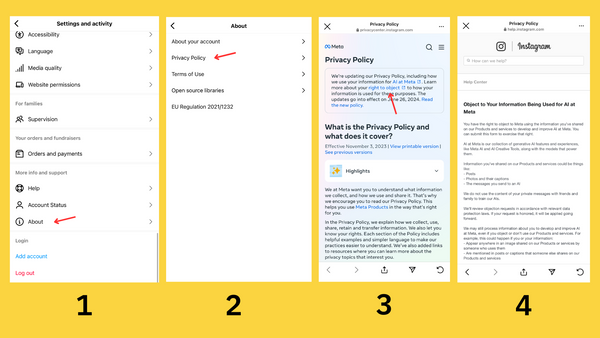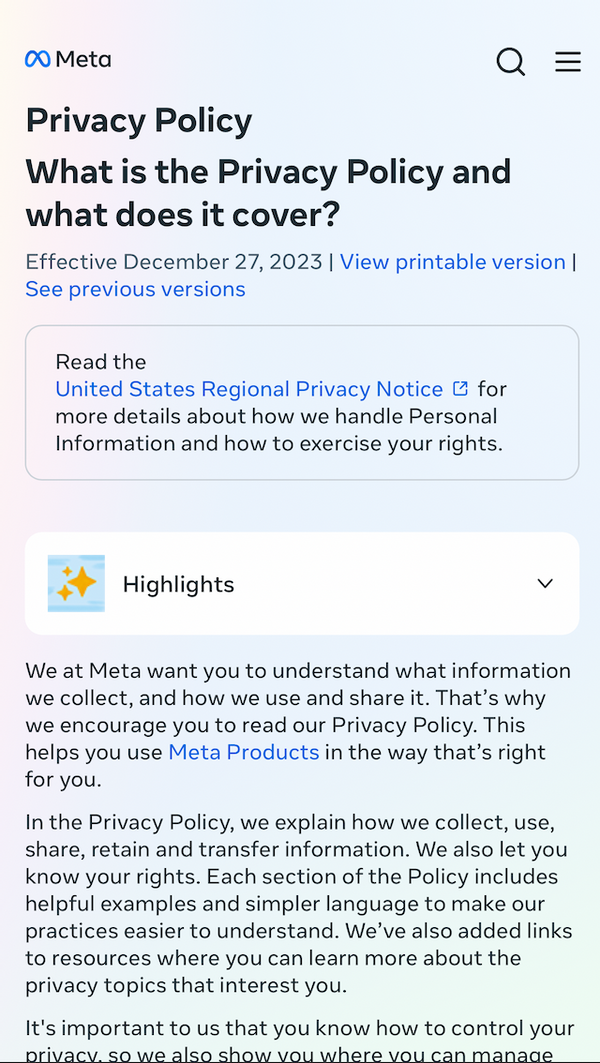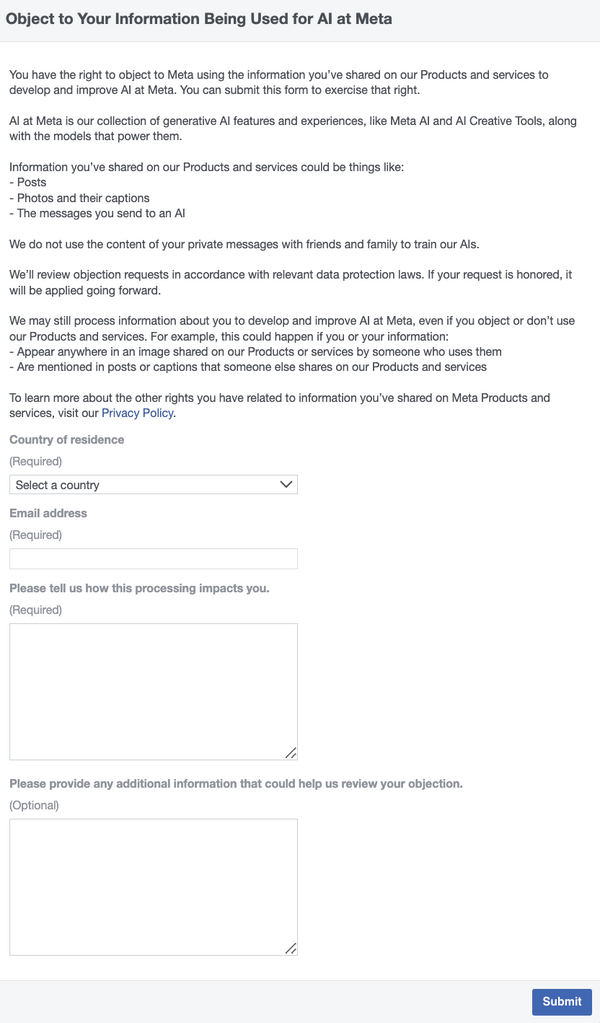Why Opting Out of Meta's Use of Facebook, Instagram Posts for AI Training Isn't Easy

In early June 2024, a number of social media users expressed concerns about announced changes in Meta's privacy policy pertaining to the use of users' data for artificial-intelligence training purposes.
In a news release dated June 10, 2024, Meta said the company, which owns Instagram and Facebook, was "working hard to build cutting edge AI technology for Europeans that reflects their languages, geography and cultural references in the same way as other regions in the world," following the example set by Google and OpenAI. "Since 22 May, we've sent more than two billion in-app notifications and emails to people in Europe to explain what we're doing," the release said. "These notifications contain a link to an objection form that gives people the opportunity to object to their data being used in our AI modelling efforts."
Multiple videos on the topic surfaced on social media, allegedly demonstrating step-by-step instructions on how users could object to Meta scraping their data for these purposes. One such video on TikTok, as of this writing, reached more 4.3 million views and 5,500 comments, and was shared more than 149,000 times, as of this writing.
In the video, a woman explained that Meta is "going to be using your public photos and your public posts to train its AI and if you don't want that to happen, which I personally don't, you can opt out," adding that "they're making it a little bit difficult to do so."
Later in the video, she explained that in order to opt out, one needed to go to Instagram settings, scroll to the bottom of the page, choose "About" and subsequently click "Privacy Policy." She continued, "You're going to be taken to a privacy policy page. Once this loads, you're going to click 'right to object' … and you're going to be taken to a form that you're going to fill out and explain why you don't want your data taken."
"Having to justify why I don't want my privacy to be violated is crazy," one TikTok user commented.
Skeptical posts about the opt-out feature also were shared on Reddit, X and Instagram. "Meta is apparently trying to make opting out of their AI training impossible. I saw a vid on how to opt out from 20 hours ago and they've already changed the landing page layout. I can't even do what a comment from 9hrs ago suggested bc that's gone too," one X user commented.
U.S. Users Didn't Receive Opt-Out Notice
In short, many of those social media posts described an authentic method of opting out of Meta's AI training program, but it seemed not everyone was able to use it. That's because while the feature was available to Meta's European Region and United Kingdom customers, it wasn't available to users in the United States.
"Facebook and Instagram users in the UK and Europe recently received a notification or email about how their information will be used for AI from 26 June," the BBC reported. In fact, in May 2024, Meta stated, "This year we plan to expand AI at Meta – our collection of generative AI features and experiences along with the models that power them – to more people across the globe, including Europe." U.S. users received no such notification.
A June 7 article in The New York Times said: "The announcement to European users sparked some backlash on Reddit, Tiktok and Twitter, including in the U.S., where Meta was not required to notify users — and therefore users may not have realized — that it had been training its A.I. with their public posts." The Times highlighted that users in the United States, where online privacy regulations are less strict than in Europe, had already had their public posts used by for AI training by Meta. "It is not clear when Meta began to scrape data from users based in the U.S," the article said.
To confirm these reports firsthand, we began by following the opt-out steps outlined in the viral TikTok video on a device located in Europe. The Instagram app guided us exactly as was shown in the video:

(Instagram app, Meta Privacy Center, Instagram Help Center)
When we followed the same steps via a device located in the U.S., we were redirected to the "United States Regional Privacy Notice" page:

(Meta Privacy Center)
When accessed from Europe, Meta's page titled "How Meta uses information for generative AI models and features" explained that users had "the right to object to information you've shared on Meta's Products and services being used to develop and improve AI at Meta." Emphasis ours:
We are committed to being transparent about the legal bases [sic] that we use for processing information. We believe use of this information is in the legitimate interests of Meta, our users, and other people. In the European region and the United Kingdom, we rely on the basis of legitimate interests to collect and process any personal information included in the publicly available and licensed sources, as well as information people have shared on Meta's Products and services, to develop and improve AI at Meta. For other jurisdictions where applicable, we rely on an adequate legal basis to collect and process this data. You have rights related to how your information is used for AI at Meta. This includes the right to object to information you've shared on Meta's Products and services being used to develop and improve AI at Meta. You can also submit requests related to your personal information from third parties being used to develop and improve AI at Meta. Learn more and submit requests here.
This a screenshot of the "Object to Your Information Being Used for AI at Meta" form available at the Facebook Help Center for European users (no such form is available to U.S. users):

(Facebook Help Center)
European Union users are protected under General Data Protection Regulation online privacy law that regulates how companies and organizations must handle, process and protect the personal data of EU residents. "We are in consultation with our lead privacy regulator in the EU, the Irish Data Protection Commission, and have incorporated their feedback to date to ensure that the way we train AI at Meta complies with EU privacy laws," a Meta news release from June 2024 stated.
We reached out to Meta with questions about the differences between its European and U.S. privacy policies and will update this article if we learn more.
Meanwhile, Chris Cox, Meta's chief product officer, explained to Bloomberg in slightly more detail what kinds of data are used. "We don't train on private stuff, we don't train on stuff people share with their friends. We do train on things that are public."
On using user data to train AI models, "We don't train on private stuff, we don't train on stuff people share with their friends. We do train on things that are public," @Meta Chief Product Officer Chris Cox #BloombergTech pic.twitter.com/FC0SWlTgqY
— Bloomberg Live (@BloombergLive) May 9, 2024
Widespread Criticism
However, both the opt-out process and Meta's planned use of users' data for AI training drew widespread criticism. The European Center for Digital Rights (noyb), a nonprofit organization based in Austria that focuses on enforcing digital rights and privacy laws, said it "filed complaints in 11 European countries, asking the authorities to launch an urgency procedure to stop this change immediately, before it comes into force on 26 June 2024."
Similarly to the feedback from social media users, the watchdog argued that the opt-out procedure was overly complicated and time-consuming. "While in theory an opt-out could be implemented in such way that it requires only one click (like the 'unsubscribe' button in newsletters), Meta makes it extremely complicated to object, even requiring personal reasons," the group said. "Shifting the responsibility to the user is completely absurd. The law requires Meta to get opt-in consent, not to provide a hidden and misleading opt-out form," said Max Schrems, honorary chairman and founder of noyb said.
"The European Court of Justice has already made it clear that Meta has no 'legitimate interest' to override users' right to data protection when it comes to advertising," Schrems said. "Yet the company is trying to use the same arguments for the training of undefined 'AI technology'. It seems that Meta is once again blatantly ignoring the judgements of the CJEU." He also expressed concerns over the possibly broad extent to which the data gathered by Meta could be used:
Meta is basically saying that it can use "any data from any source for any purpose and make it available to anyone in the world," as long as it's done via "AI technology." This is clearly the opposite of GDPR compliance. "AI technology" is an extremely broad term. Much like "using your data in databases," it has no real legal limit. Meta doesn't say what it will use the data for, so it could either be a simple chatbot, extremely aggressive personalised advertising or even a killer drone. Meta also says that user data can be made available to any "third party" - which means anyone in the world.
Meta said in a June 2024 news release that it was honoring all objections from European users.
"If an objection form is submitted before Llama training begins, then that person's data won't be used to train those models, either in the current training round or in the future," it said. "We're not using people's private messages with friends and family to train our AI systems, nor do we use content from accounts of Europeans under age 18," it continued, adding that it wasn't "using content that people have chosen to make public to build our foundational AI model that we release openly."
Update
On June 14, 2024, Meta updated its press release with the title "Building AI Technology for Europeans in a Transparent and Responsible Way," informing it was pausing the launch of its AI models:
Update on June 14, 2024 at 7:30am PT:
We're disappointed by the request from the Irish Data Protection Commission (DPC), our lead regulator, on behalf of the European DPAs, to delay training our large language models (LLMs) using public content shared by adults on Facebook and Instagram — particularly since we incorporated regulatory feedback and the European DPAs have been informed since March. This is a step backwards for European innovation, competition in AI development and further delays bringing the benefits of AI to people in Europe.
We remain highly confident that our approach complies with European laws and regulations. AI training is not unique to our services, and we're more transparent than many of our industry counterparts.
We are committed to bringing Meta AI, along with the models that power it, to more people around the world, including in Europe. But, put simply, without including local information we'd only be able to offer people a second-rate experience. This means we aren't able to launch Meta AI in Europe at the moment.
We will continue to work collaboratively with the DPC so that people in Europe have access to – and are properly served by – the same level of AI innovation as the rest of the world.
This delay will also enable us to address specific requests we have received from the Information Commissioner's Office (ICO), our UK regulator, ahead of starting the training.
"In response to 11 noyb complaints, the DPC has announced (late Friday afternoon) that Meta has committed to the DPC that it will not process EU/EEA user data for undefined 'artificial intelligence techniques'. Previously, Meta had argued that it had a 'legitimate interest' in doing so," noyb reported, adding that "There is so far no further context or information as to what this engagement looked like, or why the DPC changed its mind."
This isn't the first time we've investigated a Meta-related rumor. For example, in May 2024, we debunked a false rumor claiming that posting a legal notice on your Facebook wall would protect you from having all your posts and photos made public. We have also looked at a claim that Facebook announced plans to begin charging users $7.99 per month to access the website.
Sources:
"Building AI Technology for Europeans in a Transparent and Responsible Way." Meta, 10 June 2024, https://about.fb.com/news/2024/06/building-ai-technology-for-europeans-in-a-transparent-and-responsible-way/.
Chee, Foo Yun, and Foo Yun Chee. "Meta Faces Call in EU Not to Use Personal Data for AI Models." Reuters, 6 June 2024. www.reuters.com, https://www.reuters.com/technology/meta-gets-11-eu-complaints-over-use-personal-data-train-ai-models-2024-06-06/.
Facebook. https://www.facebook.com/privacy/policies/uso/. Accessed 12 June 2024.
---. https://www.facebook.com/privacy/genai. Accessed 12 June 2024.
Jiménez, Jesus. "Can I Opt Out of Meta's A.I. Scraping on Instagram and Facebook? Sort Of." The New York Times, 7 June 2024. NYTimes.com, https://www.nytimes.com/2024/06/07/technology/meta-ai-scraping-policy.html.
LaMagdeleine, Izz Scott. "Posting This Notice on Your Facebook Account Will Stop Platform from Using Your Photos?" Snopes, 19 May 2024, https://www.snopes.com//fact-check/facebook-account-notice-photos/.
Liles, Jordan. "Facebook To Charge Users $7.99 Per Month, as 'Channel 13 News' Reported?" Snopes, 13 Sept. 2023, https://www.snopes.com//fact-check/facebook-799-charge-coming/.
Noyb Urges 11 DPAs to Immediately Stop Meta's Abuse of Personal Data for AI. https://noyb.eu/en/noyb-urges-11-dpas-immediately-stop-metas-abuse-personal-data-ai. Accessed 12 June 2024.
Plans to Use Facebook and Instagram Posts to Train AI Criticised. https://www.bbc.com/news/articles/cw99n3qjeyjo. Accessed 12 June 2024.
"Privacy Matters: Meta's Generative AI Features." Meta, 27 Sept. 2023, https://about.fb.com/news/2023/09/privacy-matters-metas-generative-ai-features/.
Updates:
June 17, 2024: This article was updated to include information about Meta's press release shared on June, 14, 2024.

 Yahoo News
Yahoo News 
